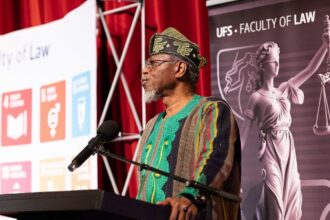A few years ago, with ignorance of how things work in Nigeria and with the assumption that we are all in government to serve our people, I actually volunteered to serve as a pro-chancellor at any tertiary institution in Nigeria. This was with the belief that serving at that level was one of the few positions where I could make a significant contribution in view of my qualifications, professional experience, and position as a monarch. I strongly believe in “what you know” as against “who you know” in making appointments to public offices. I recognize and appreciate the fact that Nigeria is blessed with many qualified people but we the monarchs equally have requisite qualifications to serve our nation beyond our very domain.
In the course of this readiness to serve at that level, I was told categorically that the position was not meant for monarchs. I was not looking for a job but only wanted the larger society to benefit from my experience. Interestingly, without ever meeting Dr Ojebode and in fact without any direct contact whatsoever with Atiba University, here we are today.
Indeed, monarchs can be pro-chancellors, and being an Iyalaje should not stop anyone from being a member of the Governing Council. We shall serve with all our strength and make you proud.
We know that lack of requisite knowledge and education is one of the major challenges facing us as a nation and Atiba University was founded to produce knowledge and provide education, thus we are in a good position to directly address some of our nation’s problems. How can we expect any genuine development when the highly educated elites refuse to participate in the democratic process? You cannot serve and influence changes in a democratic government without an established process. It is also noteworthy that you cannot build something upon nothing. Our elected and appointed officers can only serve us to the best of their knowledge.
My birth also afforded me to rise to the highest natural leadership position in life. After Obaship, there is no other position to aspire for again in life, the responsibilities are lifetime and more than enough. Thus, we are not in this appointment for business as usual or big titles, we already have enough (won fi e j’Oba, o nweawure, se o fed’Olorunni?). But we want to make huge difference within a short time. It is possible. As elucidated earlier, we understand the current challenges of our nation in which all of us are active participants, our leaders are our image, and they fully reflect our societies. We, members of the Governing Council of Atiba University shall use this opportunity to address some of the challenges, especially lack of access to education.
We are here for our stakeholders; the university is a loosely coupled system where all members are equally important. In fact, I rate the students as the strongest element of the system while all other stakeholders support it. We all have our roles but cannot play any role without the students. They shall be central to our strategy and our tenure shall be evaluated by their success. Our operations shall reflect modern trends in technology, the internationalisation of labour, globalisation and world challenges. Our research shall address challenges not only in our nation but globally. We will interface with practice and industry through our research and teaching, and we will work closely with policy makers to translate our research findings into meaningful policies and practices.
Our Centre for Yoruba Language and Culture shall focus on restoring our nation’s indigenous values that have sustained our nation to date. We must restore the dignity of our traditional institutions and Atiba University shall lead in the revitalisation of our valuable cultural heritage.
Before I end this remark, I want to call on the Federal Government to look into the policies that will provide equitable and fair education to all students irrespective of ownership of the institution. We should study best practices globally to close the infrastructural and funding gaps amongst private, state, and federal tertiary institutions. I know we have highly qualified people with thorough knowledge of education financing that could assist the government to ensure that our students are treated equitably and fairly. I have argued elsewhere, that education is not free anywhere in the world at all levels; someone must pay for it. We professors are raw materials (manufacturers or producers of knowledge too) in the education system, and we are scarce and not cheap. If output depends on input, quality education cannot be cheap and definitely never free. Please let us stop criticizing private institutions. Instead, let us call on the government to provide adequate funding for education.
As a nation, we need to be more compassionate to narrow the gaps in access to education between haves and have-nots. The current system that favours the children of the rich to attend the best institutions in the world and creates wide gaps between our children should be addressed, most of us are a product of Nigeria’s public school system and things should even get better now, with the intervention of private institutions. Our classrooms should become smaller with a low teacher-student ratio. Private institutions must however be within the reach of every student and not be the only avenue for high-quality education and a conducive environment.
We thank the President for signing the Students Loan Bill and we are looking forward to more policies that will benefit our children. Also, instead of the government taking funds out of our university system, they only need to ensure that it is adequately utilised, except if it is meant for equitable redistribution. Nothing should stop the University of Ibadan from sharing its excess funds with Osun State University. We can help in that area, and we will let the Federal Government know our position. During our tenure, we shall engage stakeholders through our institutional research on revitalising public schools and make government investment in public schools pay. How could we enforce standards and encourage investment in more private institutions to balance the school deficit?
Education provision at the tertiary level is not and should not be a for-profit business venture, and if it is, certainly it is not profitable. If anyone is in doubt, go and do the calculation. It is a dedication and gift to humanity. One of the main goals is to make a whole person who can lead a life of knowledge and freedom, participate effectively in society, and be efficient in serving communities.
It is on this note that I want again to appreciate and thank Dr. James Ojebode for his exemplary leadership and dedication to the educational development of our nation. I use him as a point of contact to thank other individuals, groups, and organisations that are championing privately run education in Nigeria. Thank you all and God bless.
Excerpts of the acceptance speech by Oba Professor Adekunle Adeogun-Okunoye Oyedeji II, at his investiture as Pro-Chancellor and Chairman of the Governing Council of Atiba University, Oyo State
READ ALSO FROM NIGERIAN TRIBUNE








